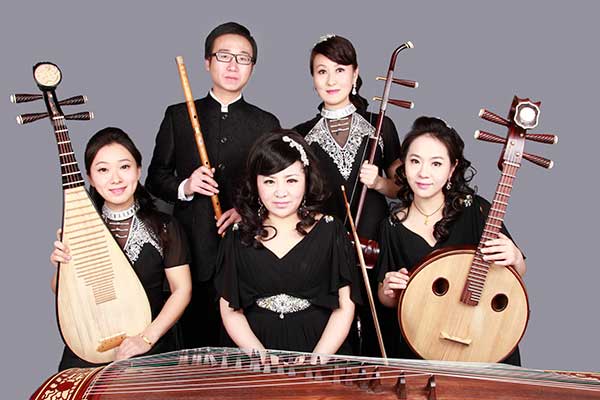 |
|
Guzheng player Fan Weiqing (center) founds her chamber music group in 2011. The members are her colleagues from China Broadcasting Chinese Orchestra.[Photo provided to China Daily] |
Next month, Fan Weiqing and 14 female students will play guzheng in Beijing. Here, she speaks about how she fell in love with the traditional instrument and what she is doing to share its music. Chen Nan reports.
Guzheng player Fan Weiqing can't forget the moment in 1987 when as a student at the middle school attached to the Central Conservatory of Music she attended a violin recital at the Beijing Concert Hall.
Listening to the music, Fan, who was 14 then, promised herself that she would one day perform solo at this venue.
At 22, she realized her dream when she was one of the top students at the Central Conservatory of Music in Beijing.
"When I perform and hold the attention of hundreds, even thousands of people with my music, it feels great," says Fan.
Now, decades later, the 43-year-old guzheng (Chinese zither) player still exudes the same excitement about performing when she does solo recitals not just in Beijing but also around China.
This summer, she and her students will perform at the Forbidden City Concert Hall in Beijing.
All the 14 female students who will perform with her were chosen by Fan three years ago from among those who are amateurs and had won awards at national guzheng competitions.
Their debut show was at Beijing's Zhengyici Theater in 2013, and they will perform at the National Center for the Performing Arts next year.
For the upcoming concert, Fan will lead them in playing classic guzheng pieces, including Along the River During the Qingming Festival-a piece inspired by the famous painting of the same title-which was written by composer Lin Ling from the China Conservatory.
The guzheng, which is believed to have been born during the Warring States Period (475-221 BC), is a Chinese plucked zither and is thought to be the precursor of several Asian zither instruments such as the Japanese koto, the Mongolian yatga, and the Korean gayageum.
Fan, who is known for her interpretation of classic gu-zheng pieces, says that unlike some traditional Chinese instrumentalists, who try to give their performances a contemporary twist she will keep playing the guzheng in the traditional way.
Born in Beijing, she was introduced to the guzheng at 4 by her parents. But she used to get bored with the long hours of practice and used to cut the strings of the instrument with a pair of scissors when her parents were at work.
Fan did not take her music seriously until she joined the primary school attached to the Central Conservatory of Music and won the first prize at a national guzheng competition at 9.
"I then started listening to lots of classic guzheng works performed by established masters, and this made me believe that the guzheng pieces should be performed as traditionally as possible. There is no need to cater to modern audiences," she says.
|
|
|
|
|
|
|
|
